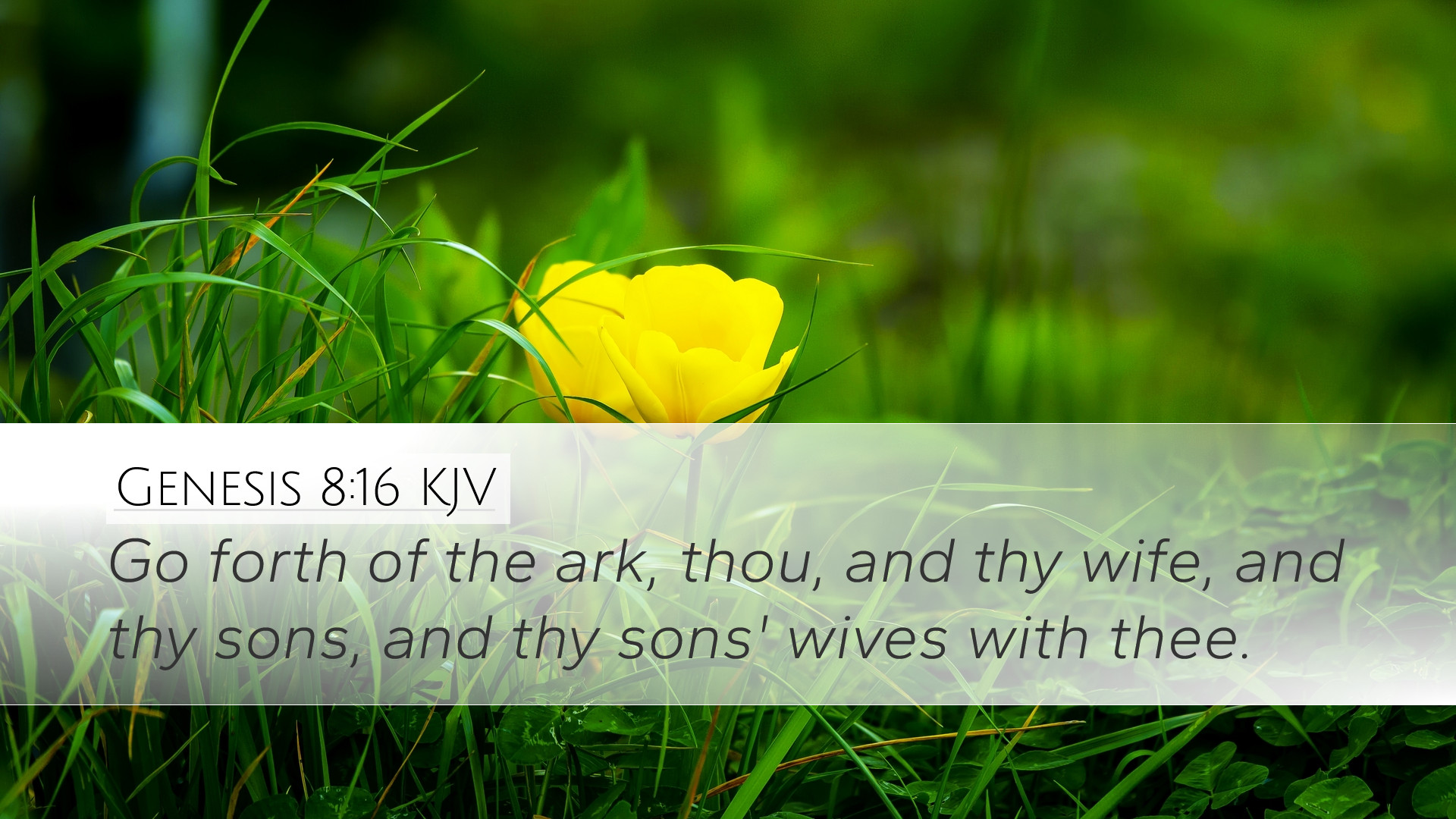Genesis 8:16 Commentary
Verse: "Go forth of the ark, thou, and thy wife, and thy sons, and thy sons' wives with thee."
Introduction
This verse marks a significant turning point in the narrative of Noah and the flood. After enduring an extended period of judgment, Noah is commanded by God to leave the ark, symbolizing salvation and a new beginning for humanity. This commentary integrates insights from various public domain sources, including Matthew Henry, Albert Barnes, and Adam Clarke, drawing theological reflections that are pertinent to pastors, students, theologians, and Bible scholars.
Contextual Background
The context of Genesis 8 is pivotal, as it occurs after the great deluge that cleansed the earth from wickedness. Noah's faithfulness and obedience have been richly rewarded by God through the preservation of his family and the animals aboard the ark. The flood serves as both judgment and a means of restoration, setting the stage for the renewed relationship between God and mankind.
Divine Command to Depart
God’s Direct Command
In this verse, God's instruction is clear and direct. The phrase "Go forth of the ark" emphasizes God's authority and sovereignty. Matthew Henry highlights the obedience of Noah as a model for believers today, suggesting that God's commands should be followed dutifully without hesitation.
- Divine Authority: God's command demonstrates His absolute control over creation.
- Obedience: Noah's response to God's command serves as an exemplar for all believers, illustrating the importance of trust in divine guidance.
The Significance of Family
Noah is commanded to bring his entire family with him as he steps out into a restored world. This underscores the significance of family in God's redemptive plan. Albert Barnes comments on the nature of familial relationships, noting that the preservation of Noah’s family signifies the continuity of God's promise to humanity.
- Family Unity: The collective obedience and protection of Noah's household highlight the importance of unity within families.
- Legacy of Faith: The example set by Noah establishes a foundation for future generations to build upon, emphasizing the role of faith within the family structure.
Theological Implications
Adam Clarke points out several theological themes encapsulated in this brief command. The departure from the ark signifies a new covenant and hope for humanity. It symbolizes not only physical deliverance but also spiritual rebirth, which echoes the New Testament themes of salvation and resurrection.
- New Beginning: The exodus from the ark represents a fresh start, akin to the Christian experience of being born again.
- Covenant Relationship: This moment foreshadows the later covenants God establishes with humanity, culminating in the New Covenant through Jesus Christ.
The Role of Obedience in Restoration
The act of leaving the ark can also be viewed as a testament to obedience that leads to restoration. Noah's obedience to God's commands throughout the narrative serves as a precursor to the blessings that follow. Matthew Henry suggests that obedience opens the doorway to divine favor, reinforcing the notion that faithfulness in times of trial ultimately leads to divine restoration.
Conclusion
Genesis 8:16 encapsulates profound themes of obedience, family, divine authority, and the promise of restoration. The departure from the ark is not merely a physical act; it signifies a spiritual and covenantal milestone in God's relationship with humanity. Pastors and theologians can draw upon these insights to emphasize the importance of trust in divine instructions and the transformative power of familial and covenant relationships. As believers reflect on Noah's experience, they are reminded that fidelity to God's commands in the face of adversity lays the groundwork for experiencing His promises of new beginnings and hope.


